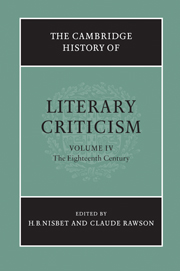Book contents
- Frontmatter
- INTRODUCTION: CRITICISM AND TRADITION
- GENRES
- LANGUAGE AND STYLE
- THEMES AND MOVEMENTS
- 18 Sensibility and literary criticism
- 19 Women and literary criticism
- 20 Primitivism
- 21 Medieval revival and the Gothic
- 22 Voltaire, Diderot, Rousseau and the Encyclopédie
- 23 German literary theory from Gottsched to Goethe
- 24 The Scottish Enlightenment
- 25 Canons and canon formation
- LITERATURE AND OTHER DISCIPLINES
- Bibliography
- Index
- References
24 - The Scottish Enlightenment
from THEMES AND MOVEMENTS
Published online by Cambridge University Press: 28 March 2008
- Frontmatter
- INTRODUCTION: CRITICISM AND TRADITION
- GENRES
- LANGUAGE AND STYLE
- THEMES AND MOVEMENTS
- 18 Sensibility and literary criticism
- 19 Women and literary criticism
- 20 Primitivism
- 21 Medieval revival and the Gothic
- 22 Voltaire, Diderot, Rousseau and the Encyclopédie
- 23 German literary theory from Gottsched to Goethe
- 24 The Scottish Enlightenment
- 25 Canons and canon formation
- LITERATURE AND OTHER DISCIPLINES
- Bibliography
- Index
- References
Summary
‘Among the ancients’, wrote Robert Eden Scott, the first Professor of Moral Philosophy in King's College, Aberdeen, ‘Criticism was chiefly cultivated as an art, and consisted rather in practical rules than in scientific investigation: it is to the Moderns, and those too of a very late date, that we owe a philosophical investigation of that science of Rhetoric, and an analysis of those faculties of the mind, upon which peculiar effects are produced, by literary composition, in its various kinds.’ ‘Philosophical investigation’ was the occupation of Scottish academics, ministers and lawyers in the heyday of the Enlightenment. It was rooted in the Scottish system of higher education, and it flowered in the concern for professional status, communal interests and national identity which evolved from the religious, political and cultural events of the recent past.
A strong sense of changing times, embodied in the Act of Union in 1707, of the superior refinement and politeness of metropolitian society, and of the need for efficiency in communication and consensus not only between countries but among regions (forcing to the periphery the issue of the large Gaelic-speaking population), determined the priorities of inquirers pursuing those ‘inner formative forces’ which for Cassirer distinguished the mind of the Enlightenment. Forces such as feeling, sympathy and taste, inherent in the writings of Shaftesbury and his popularizer Addison and grafted on to the stock of humanist speculation congenial to the religious temper of Scotland were expanded by Francis Hutcheson in the Inquiry into the Origin of our Ideas of Beauty and Virtue (17Z5). These found their way into the critical principles of Smith, Hume and their contemporaries.
- Type
- Chapter
- Information
- The Cambridge History of Literary Criticism , pp. 546 - 559Publisher: Cambridge University PressPrint publication year: 1997

